What is the best lens for real estate photography at an affordable price?
I’ve been working in the US real estate photo business for a long time and wasted more than $30,000 buying different lenses. Finally, I’ve found the only and best lens for real estate photography, which any property photographer should have.
Typically, lenses suitable for real estate photos cost somewhere between $300 and $600 for cheaper models and between $1400 and $3000 for premium models.
Entering the world of real estate can be extremely difficult when it comes to navigating through a variety of lenses available on the market. In this article, I will help you select the best option for your camera for real estate photography. Whether you prefer a full-frame or a crop sensor camera, read on to learn how to select a great lens from a reputable brand.
Even if you use the best camera lens, you might still need to post-process your photos afterward. Poorly edited photos can dissuade clients from making a purchase.
If you want to save time and money, contact our professional editing service. The FixThePhoto team will quickly tweak colors, adjust exposure, remove distortion, and apply an HDR effect.
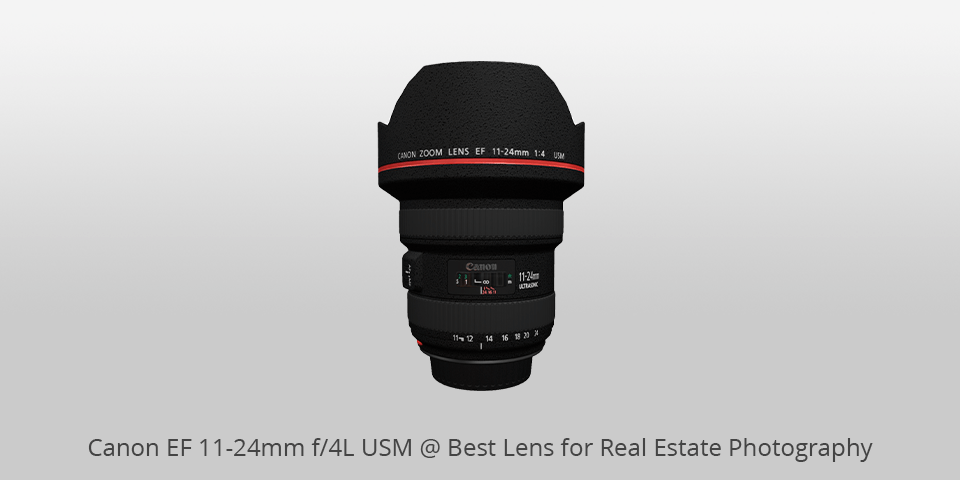
Focus Lengths: 11-24mm | Aperture: f/4 | Lens Mount: Canon EF | Weight: 2.60 lbs
This ultra-wide lens for real estate photography is going to come in handy in rooms with little space. Constant f/4 maximum aperture offers consistent performance. The improved lens coating prevents the formation of flares. The autofocus is very fast and almost silent with manual focus override function.
With this model you will capture architectural images with minimal distortion. This model has an advanced optical design. UD and Super UD high-quality elements deliver exceptional sharpness within the whole range. It’s a full frame and one of the best lenses for interior photography. Its focal range starts at 24mm and stretches out to 11mm.
The focus ring turns very smoothly and precisely. The model has a weather sealing gasket. In this class of lenses, Canon achieved a record viewing angle of 126 05 ‘- 84 00’ diagonally. The model has a great build and sharp optics.
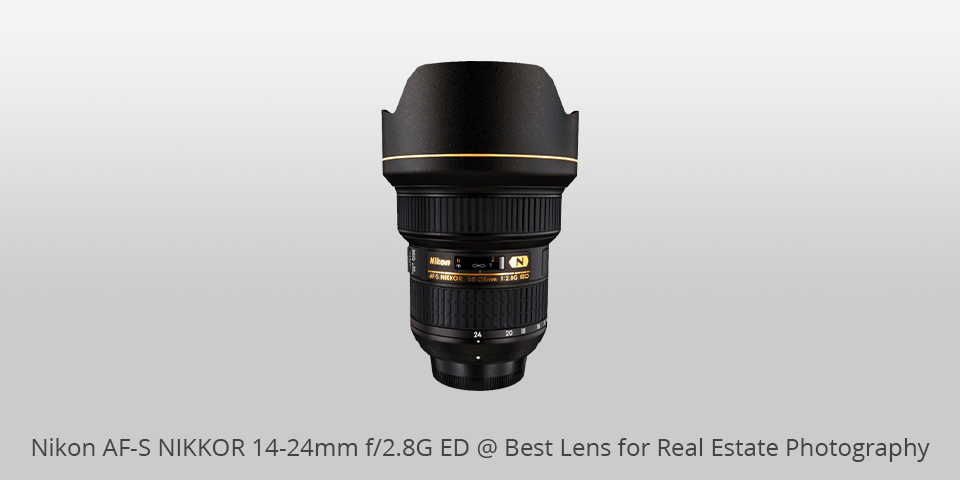
Focus Lengths: 14-24mm | Aperture: f/2.8 | Lens Mount: Nikon FX | Weight: 2.14 lbs
The AF-S NIKKOR 14-24mm f/2.8G ED Lens from Nikon will come in handy for photographers who are looking for a zoom lens with an ultra-wide angle. Thanks to its constant f/2.8 maximum aperture, this best lens for real estate photography allows you to take sharp, high-contrast images without any sign or blur. Just like other Nikon lenses, it supports improved light transmission thanks to the Nano Crystal and Super Integrated Coating that minimizes ghosting and flare.
Due to 2 ED elements and 3 aspherical lenses, it doesn’t produce any chromatic and spherical aberrations. The lens is compatible with FX and DX-format DSLR cameras. It supports the 35mm focal length equivalent to 21-36mm.
The lens is fitted with the Silent Wave Motor (SWM) and internal focus system, which accounts for quick, quiet, and precise autofocus. This G-type lens comes without an aperture ring, which makes it lighter and more compact. You can adjust the aperture using the camera’s command dial. The lens is made of a magnesium alloy. In addition, it is dust and moisture-resistant. Thanks to the integrated hood, the front lens element is fully protected.

Focus Lengths: 12-24mm | Aperture: f/4 | Lens Mount: Optional | Weight: 1.25 lbs
If you are looking for capable Sony lenses for Sony cameras, this is a perfect choice. This lens is compatible with other cameras as well if you have a lens mount. Unlike other wide-angle lenses, it minimizes optical aberrations, thus allowing you to take high-resolution images.
Thanks to the Motor AF system, this real estate photography lens supports noiseless but accurate autofocus. Besides, you can change the focus manually. The lens is pretty compact and lightweight, which makes it a perfect option for travel photographers as well as anyone who likes taking photos of landscapes and architecture. The only disadvantage is that, similarly to many ultra-wide lenses, it has a bulging front element. This is why it might be difficult to use this lens with filters.
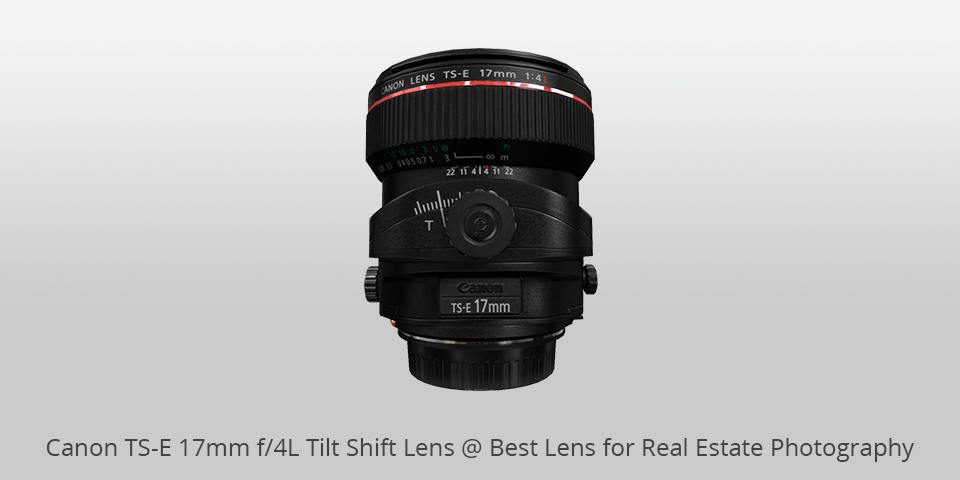
Focus Lengths: 17mm | Aperture: f/4 | Lens Mount: Canon EF | Weight: 4.2 lbs
I have mentioned this model before and this is the best option among tilt shift lenses. This high-end lens provides minimal distortion even at the edges of the image. Canon TS-E 17mm f/4L Tilt-Shift Lens allows ± 6,5 tilt and ± 12 mm shift. Its aspherical elements together with ultra-low dispersion and some techniques minimize any sorts of aberrations.
SWS surface and Super Spectra coating suppress glare and reflections. It has a floating internal focusing mechanism that provides high-quality images across the entire focus range. The features of these models complement each other. When you are cornered in a small room, a 24mm camera will not be wide enough and that's where this 17mm lens comes in handy. If you are going to use the lens & camera combo outdoors to take city shots, make sure to employ a tripod for real estate photography to stabilize such a bulky setup.
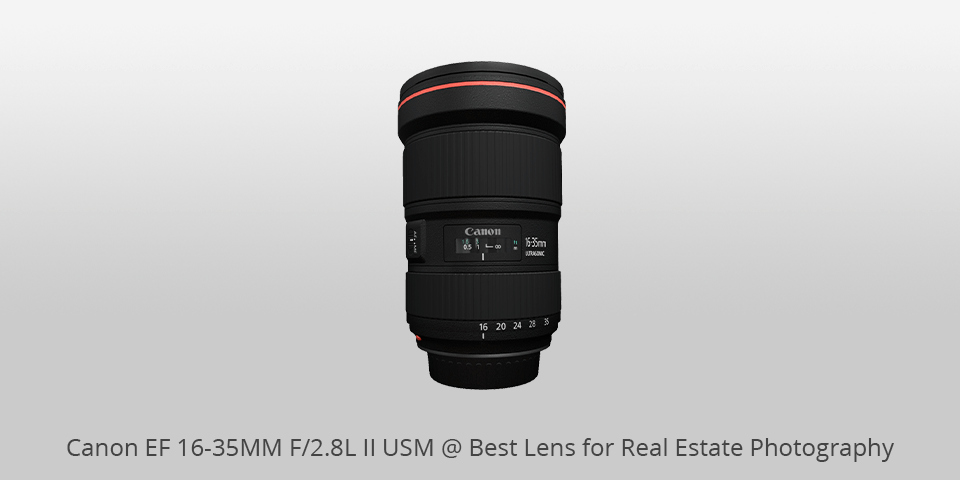
Resolution: 1920x1080 | Contrast Ratio: 3000:1 | Brightness (Lumens): 4500 | Screen size: 32" - 200"
This lens is indispensable in photography for real estate. It belongs to Canon standard zoom lenses. The model has a powerful zoom, and also provides exceptional sharpness of the edges of the image. The maximum f/4 aperture enables you to shoot under a variety of lighting conditions.
Besides, this model is designed for shooting in all weather conditions and is protected from dust and moisture. Another huge benefit is that it’s compatible with Canon full frame as well APS-C sensor cameras. The price is steep, but it definitely corresponds to the quality.
Modern coating technologies, 3 high-precision aspherical lens elements and 2 Ultra Low Dispersion glass elements that it features, minimize barrel distortion and aberration, that are common problems for wide-angle lenses. This model manages to capture space, without any misrepresentation. Its another advantage is zoom ring: it’s really smooth with a minimal amount of resistance. Thanks to its exceptional performance you will be able to constantly get sharp results.
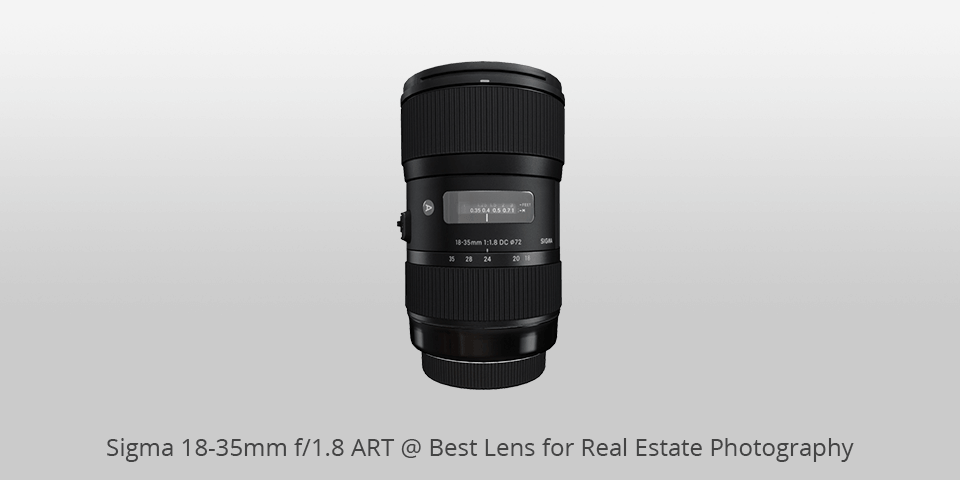
Focus Lengths: 18-35mm | Aperture: f/1.8 | Lens Mount: Optional | Weight: 1.79 lbs
It’s got even better picture quality than most f/1.8 prime lenses, which can’t even zoom! Professionals and amateurs in this sphere alike will love this lens, because the interface is friendly, and you absolutely don’t need to attend real estate photography classes to understand how it works. It’s an extremely efficient and practical model that you can incorporate into a variety of property shoots.
It works really well in low light, which makes it a great lens for night photography. Such value for a fraction of the price is really rare. Optical steady shot, smooth zoom, 16-35mm range, constant f/4 aperture and weather-resistant construction make for an incredible combination. Together with the flash it creates incredible twilight photographyof the buildings.
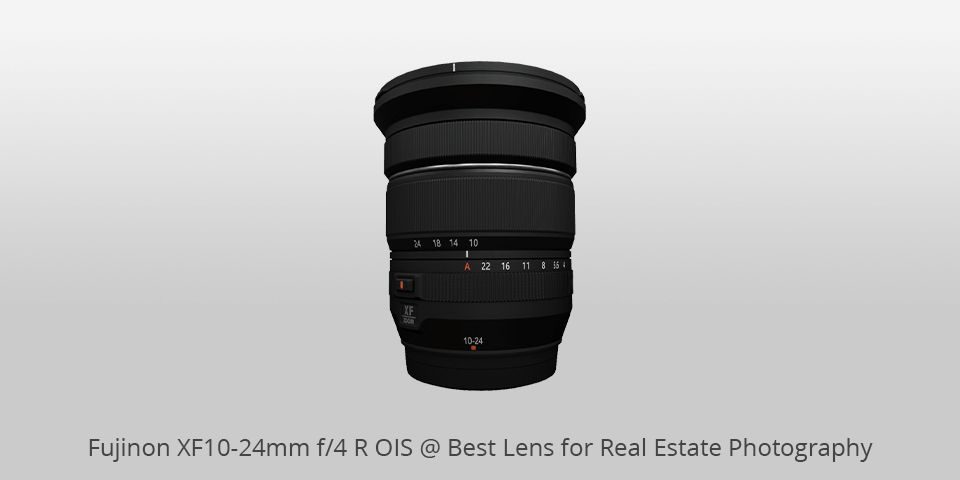
Resolution: 1280x720 | Contrast Ratio: 5000:1 | Brightness (Lumens): 150 | Screen size: 30" - 300"
This is surely the best one available in Fuji’s lineup. Like all the Fuji lenses, this is a well-built lens. It’s tightly assembled and everything operates smoothly. One of the greatest benefits of this lens is that you can use filters, which are not typical for wide-angle lenses.
It’s difficult for amateur photographers to accurately estimate how wide the focal length should be for interior shots. When shooting indoors you can go as wide as 10 mm on this lens. Such focal length will prevent line distortion which makes it a perfect lens for interior photography. As a result, you will get images that are sharp within the entire range with little or no distortion at all.
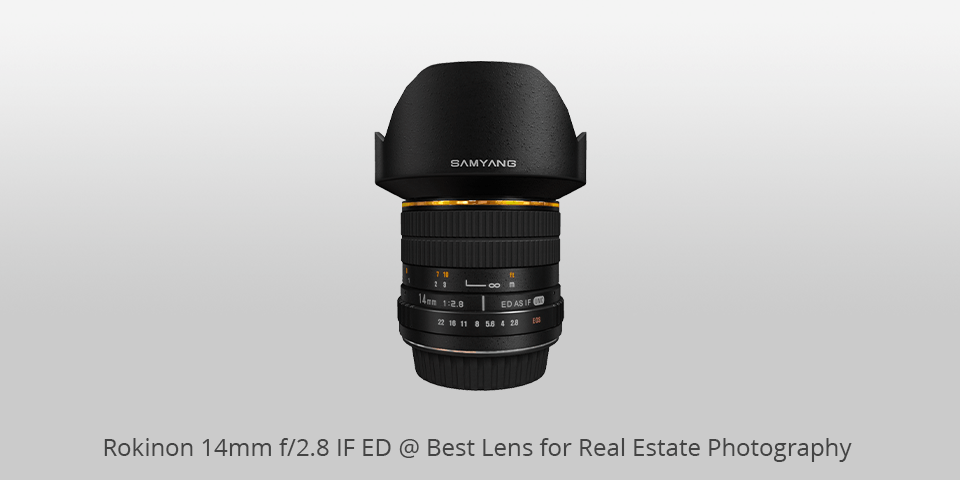
Focus Lengths: 14mm | Aperture: f/2.8 | Lens Mount: Optional | Weight: 1.22 lbs
This is the best budget lens for this photography genre. If you are doing small to medium sized houses, this is the best option for you. Its focal length is 14 mm and it can have a constant aperture of f/2.8.
There is some distortion, but it’s not extreme at all. If you use software to correct lens distortion - it can take the distortion away in a single click. This model has manual focus and even manual aperture.
It’s going to speed up not only your editing workflow but also the shooting process. It’s a full-frame lens, which is relatively sharp and the combination of f/2.8 aperture and 14mm focal length makes it the most optimal choice for your first lens.
| IMAGE | NAME | FEATURES | |
|---|---|---|---|

|
Canon EF 11-24mm f/4L USM
OUR CHOICE
|
CHECK PRICE → | |

|
Canon TS-E 17mm f/4L
TILT SHIFT
|
CHECK PRICE → | |

|
Rokinon 14mm f/2.8 IF ED
BUDGET
|
CHECK PRICE → |
When purchasing this type of real estate photography equipment, you need to take two things into consideration: focal length range and aperture.
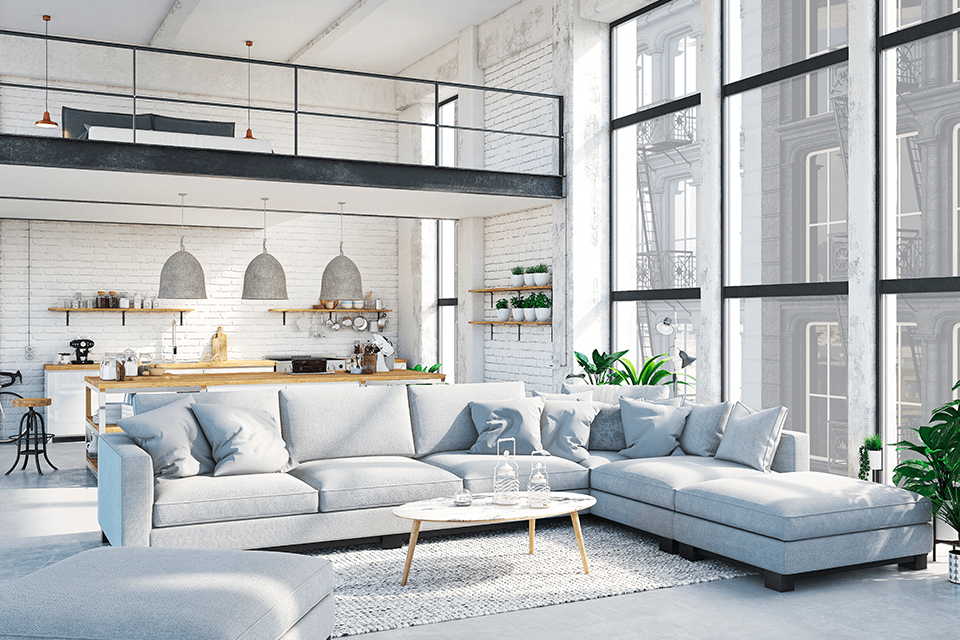
Aperture controls the amount of light passing through the lens and affects the depth of field within a photo. Aperture sizes are measured by f-stops. For example, a high f-stop like f-16 means that the shutter opening is small, and a low f-stop like f/1.8 means that it is wide open.
The smaller the number the more shallow the depth of field is.
Low aperture is rarely used in property photography unless you want to highlight a particular subject in the room or the lighting conditions are poor. The higher the maximum aperture of a lens the more expensive it is. What f-stop to use for real estate photos depends upon many factors, but normally f/5.6 and above is the best choice.
Focal Length is the field of view for a particular camera lens, represented in millimeters (mm). The shorter it is, the wider the angle of view is. Some amateur photographers rush to buy ultra-wide lenses to raise their real estate photography rates, but shooting too wide can actually distort your photos and stretch the edges of your shot.
For the bulk of property photos, lenses in the range of 20-25mm are what most of the professionals tend to use. Choosing the wrong focal length may drastically affect your background.
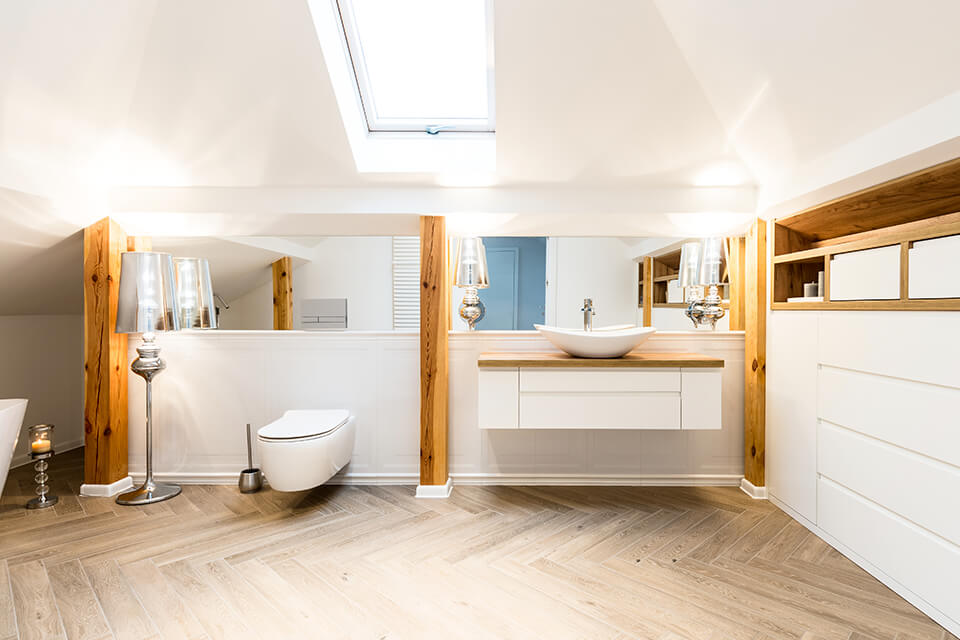
Prime lenses will be perfect for those who need to take sharp photos, but zoom lenses have more uses. They are almost just as sharp as prime lenses, but you can use them for taking different kinds of photos, which makes them a great bang for your buck.
Even if you are on a tight budget, it might be a good idea to pay more for a zoom lens to take photos at different focal lengths. Besides, such lenses are pretty lightweight, and you can easily fit them into your camera bag.
Full-frame cameras generally offer better image quality, but APS-C or crop sensor cameras can be more budget-friendly and still deliver good results. If using a crop sensor camera, consider the crop factor when choosing your lens.
Real estate photographers often encounter low-light situations or shoot handheld. In such cases, image stabilization can be beneficial to avoid camera shake and take sharp images.
Tilt-shift lenses allow you to correct perspective distortion and are handy when shooting buildings and architecture. They can be expensive, but they offer unique benefits for real estate photography.
In most cases, the answer is no. If you have a budget DSLR that comes with an 18-55mm lens, keep in mind that this lens is not nearly wide enough for taking photos of interiors. However, you can use it for capturing pictures of exteriors.
When photographers talk about a “crop factor,” they refer to the size of a camera sensor. For real estate photography, it’s better to use a full-frame camera. If you multiply the crop factor by the focal length of the lens, you can figure out the focal length of a full-frame camera. This way, it will be easier for you to take professional photos.
If you have just founded your company, keep in mind that it might take you from 1 to 3 years to make your business profitable. The average real estate photography salary is $50,000 annually, however, many professional photographers earn $90,000+ every year.
While there are many reliable manufacturers on the market, it’s better to select a lens that fits your camera body perfectly and has a suitable focal length with aperture. If you have some cash laying around, opt for the best lenses for real estate photography released by Sony, Canon, or Nikon since these major brands stand out for the high quality of their products. To save money, buy lenses from the Tamron, Tokina, Sigma, or Rokinon brands.